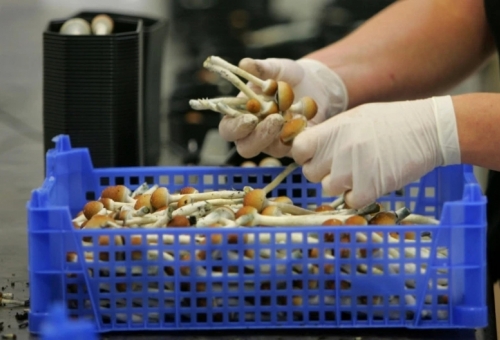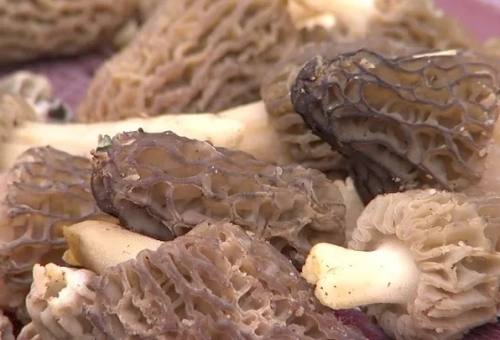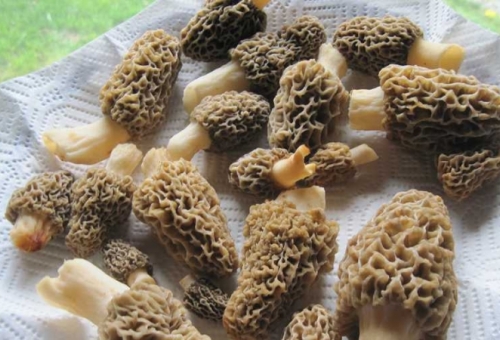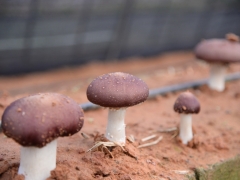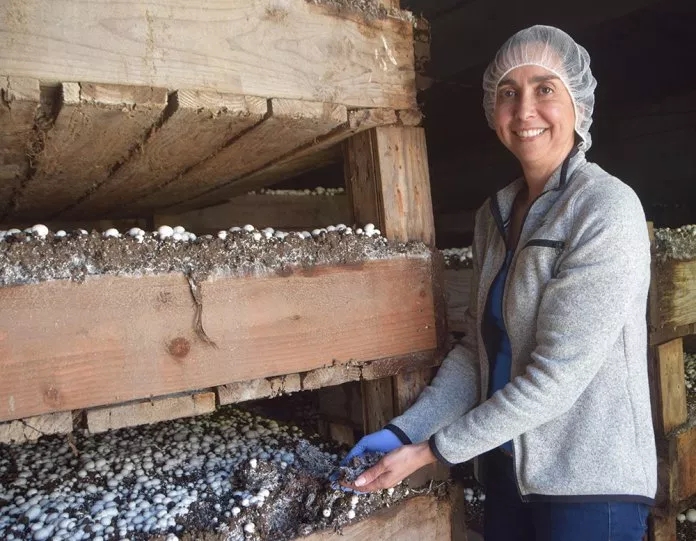
As the annual Morgan Hill Mushroom Mardi Gras approaches, it only seems appropriate to further examine Santa Clara County’s second biggest agricultural product, the mushroom.
Garlic gets lots of play locally, with Gilroy as the self-designated Garlic Capital of the World and hosting the Gilroy Garlic Festival. But the $79 million in annual Santa Clara County mushroom sales, according to the most recent Santa Clara County crop report, soars above garlic’s $6.5 million like a towering portobello.
At one of the area’s mushroom farms, Del Fresh Produce at 11300 Center Avenue in Gilroy, mushrooms are grown by the ton, but business continues to be a challenge because of a lack of labor, and strict state and federal regulation.
The buck stops with Don Hordness in his absolutely no-frills office at Del Fresh Produce, one of the most productive mushroom farms in one of the most prolific mushrooms growing locations in the world.
California ranks third, behind Pennsylvania and the entire country of Canada when it comes to growing mushrooms.
At Del Fresh, it all starts with the soil, which the company produces from raw wheat straw and cottonseed meal, along with 100 tons of compost a month.
“Composting is like, if a tree falls in the woods, it takes some years for that tree to break down into the soil, but we rev it up here,” Hordness said. “We add nitrogen to the straw, and we grow these thermophilic bacteria and fungus, and those little guys break it down. We build tight piles that build up the heat, between 130 and 160 degrees. That’s when you see the steam rising off the piles—that’s when the bacteria is eating up the nutrients.”
As it turns out, the mushroom is part of the thermophilic process of breaking down topsoil. The meaty mushroom is a fungus after all.
“We bring out the compost and leave it in a controlled environment for seven days, and the mushroom is part of the process,” Hordness said. “once we lay the compost down, we plant the mushroom spores.”
Del Fresh buys its mushroom spores from certified plant labs. The microscopic spores are planted into the pasteurized compost contained in six-foot by four-foot planters stacked five high, placed in a controlled cool and dark grow rooms, and two weeks later the spores spread like white spider webs through the compost. As the mushrooms eat through their food supply, the caps bloom, and are ready for picking.
Mushroom Business
Del Fresh grows White Button, Crimini and Portobello mushrooms for stores like Trader Joe’s, Safeway, and others. Typically, Del Fresh produces 60,000 pounds of mushrooms every week, year round. Since mushrooms weigh about one ounce each, that’s almost a million mushrooms every week.
It takes 50 employees, from harvesters, packers and mechanics to grow a million mushrooms a week. Finding new employees, however, has become increasingly difficult.
“If you’re breathing and look like you can pick up 25 pounds,” joked Del Fresh Food Safety Coordinator Emily Bettencourt. “A lot of times they come here for a couple of days, and they’re gone. They want a lot of money, for very little effort.”
Workers are in short supply. In January the unemployment rate in California dropped to an all-time low, and nationally the rate was at 3.9 percent in April according to the United States Department of Labor.
Some of the most lucrative jobs at Del Fresh Produce are the 18 mushroom harvesters. Del Fresh does not use mechanical hands, but rather those of the harvesters, who on average pick 60 pounds of mushrooms an hour for .22$ a pound. Some can average 100 pounds an hour.
“The ones that pick 100 pounds an hour can make about $80,000 a year, with benefits and a 401 K,” Bettencourt said of the United Farm Workers Union members.
Finding workers is hard, and so is steering through the stormy seas of the many state and federal regulatory agencies the farm must satisfy. Bettencourt thumbed through a stack of business cards, and named a few; Bay Area Air Quality Management District, County of Santa Clara Department of Environmental Health, California Air Resource Board, USDA.
“If you look on Craigslist, there are a lot more jobs on there that weren’t there five to eight years ago,” Bettencourt said. “If you look at transport jobs, it’s all Doordash, Uber, and Lyft; they suck up the labor.”
Of particular difficulty to satisfy, is the Public Health Drinking Water Division. Del Fresh Produce is required to test for nitrates, and ever since the Llagas Creek sewage spill in January 2017, it’s required to buy a water scrubbing system for its well water.
“Two weeks ago I went to the Safeway in Morgan Hill, and I saw a sign that said, ‘Safeway supports local farmers,’ and I thought, ‘how nice,’” Bettencourt said. “I look, and I find mushroom from Canada. I wrote them an email and asked why they buy mushrooms from Canada when they’re in a mushroom capital. The response they sent was pretty lame, but I checked a week later, and they had Monterey Mushrooms. Maybe they did hear.”
The Mushroom Mardi Gras Festival, May 26-27 at the downtown Morgan Hill Amphitheater Grounds and Depot Street, is an annual celebration of the mushroom and family fun. The Mushroom Mardi Gras Festival is a non-profit organization that awards scholarships to high school students in the Morgan Hill Unified School District, grants for elementary and middle schools, along with donations to local clubs and organizations.





